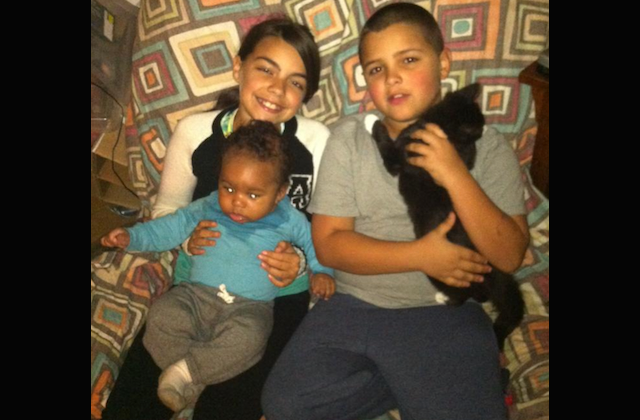Cassandra Merlin says that her 8-year-old son Quincy experienced racist bullying well before August 28, when a group of local teenagers attempted to hang the child in a backyard just steps away from Merlin’s own home in Claremont, New Hampshire.
“When they were teaching in school about slavery, kids would tell him they couldn’t play with them because they were White and he was Black,” she told The Root yesterday (September 13). “And he’s had kids call him the n-word, and tease him for being a different race."
Merlin told The Root that Quincy and his 11-year-old sister Ayanna went to the house to look for one of Quincy’s friends. There, they encountered a number of teenagers who Merlin said "had been jumping Quincy" earlier in the day. “And Quincy being the kid that he is, he just wants people to like him, [so he] decided to forgive the kids for what they had done and continued to play with them and his sister.”
She said the teenagers then beat him and taunted him and Ayanna with racist slurs and "White pride" comments. The teenagers then removed the tire from a nearby tire swing and put the hanging rope around their own necks before telling Quincy to do it. Qunicy climbed onto a picnic table and put it on his neck, then one of the boys pushed him off the table. Ayanna then started screaming for help while Quincy was suspended in the air, struggling to breathe. He then fell to the ground. Merlin said that when she arrived, she saw three kids running away. She rushed her son to a local hospital, where he was airlifted to Dartmouth-Hitchcock Medical Center for further treatment.
Merlin told The Root that the alleged attempted lynching did not cause Quincy any permanent injuries. She adds that while he’s largely handling the trauma well, she hopes he can start therapy. Meanwhile, Ayanna is dealing with the fallout at school. "She actually goes to school with the boy [who pushed Quincy off the table] and has to deal with a lot of taunting at school from kids who say she’s a liar and that are friends with the boy," Merlin explained. "That makes it a little hard for her. She’s been in the guidance counselor’s office quite a few times since school started. And school only started last week.”
Merlin said that her family’s struggles are intensified by what she describes as dismissive treatment by the Claremont Police Department.
"They’re not really good at keeping up with me,” she explains. “They say they’re going to call and then they don’t. And then I call and they’ll return the phone call a couple of days later. And they always say, ‘Well, we have a lot going on, and we’re doing interviews and we’re doing this and that.’ And they’re not very good keeping up with me and it’s hard."
Her boyfriend handles most police interactions, and she says officers only spoke to Quincy once and never talked to Ayanna. Merlin adds that Claremont Police Department chief Mark T. Chase told her boyfriend on Tuesday night (September 12) that he is "getting a lot of backlash from this, but I just wanted to know that I am doing what I can do."
Chase initially refused to reveal anything other than the fact that the investigation was happening. But mounting criticism and attention from New England racial justice groups finally prompted a statement to the local Valley News, in which Chase defended his confidentiality by citing the offenders’ juvenile status: "Mistakes they make as a young child should not have to follow them for the rest of their life."
“[Comments like that] show [Chase] doesn’t understand the severity of the situation,” says Merlin. “Because at the end of the day, Quincy could have died. I feel like they’re not taking it as seriously because he didn’t die.”
Chase issued a statement on September 12, saying that the department would treat the assault as a hate crime pending other confirming details. NBC News reported today (September 14) that New Hampshire governor Chris Sununu directed the state attorney general’s office to assist the Claremont Police Department in determining if the assault qualifies as a hate crime, which would then involve federal investigation and prosecution.
Merlin, who partnered with a friend to raise money for therapy for the kids via GoFundMe, told The Root that she hopes the situation will draw attention to the reality of racism in small towns like Claremont. “This kind of stuff does happen," she says. "Everywhere. Even in a small town in New Hampshire." The U.S. Census notes that Claremont is more than 95 percent White and only 0.6 percent Black.
Read the full article at The Root.com.
